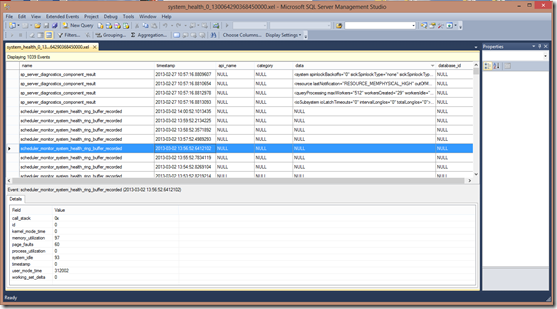SQL 2012 System health–fast analysis
Once we encounter a few problems with the SQL 2012 and we need to analyze it, what will be the first recommended step to start with?
During my last post I have discussed the default trace in SQL and its benefits.
SQL 2008 introduced a new option called extended events (which is also know as Xevents), it allows the DBA to get information regarding the SQL Instance. On the 2008 version, working with Xevent was complicated and clumsy.
It is important to understand the idea that Xevent will replace the good and old Profiler, so every DBA needs to know and work with Xevents.
Here is the MSDN quote on the future deprecation of SQL Server Profiler (and the Link).
"We are announcing the deprecation of SQL Server Profiler for Database Engine Trace Capture and Trace Replay. These features will be supported in the next version of SQL Server, but will be removed in a later version"
https://msdn.microsoft.com/en-gb/library/ms181091.aspx
SQL 2012 gives the Xevents a boost forward and simplified the way of working with it.
In SQL 2012, the DEV team added a kind of default Xevent trace called system_health*.xel The files are placed in the LOG folder.
Mostly when addressing an SQL server with performance issues and we'd like to do a fast checkup to get a direction on where the problem can be. We will be able to read this info with these files.
This XEL files can be viewed in 2 ways:
-
Windows rich client: double clicking with the mouse on the XEL file will open the SSMS (SQL Server Management Studio) showing the file information.
You can add columns, filters, aggregate the information and group it.T-SQL, you can use the function sys.fn_xe_file_target_read_file
This function will get the file location as a parameter and will read the XML file.Here are 2 DEMO of and XEL file T-SQL that returns information.
- Spinlock and CPU utilization:
declare @path_to_health_session nvarchar(1000) = 'C:\Program Files\Microsoft SQL Server\MSSQL11.SQL2012NEW\MSSQL\Log\system_health_*.xel'
select
TODATETIMEOFFSET ( T.sdnodes.value('(event/@timestamp)[1]','datetime'), '-06:00') as [timestamp],
T.sdnodes.value('(event/data[@name="component"]/text)[1]', 'varchar(100)') as [component_name],
T.sdnodes.value('(event/data[@name="state"]/text)[1]', 'varchar(100)') as [component_state],
T.sdnodes.value('(event/data[@name="data"]/value/system[1]/@spinlockBackoffs)[1]', 'int') as [spinlockBackoffs],
T.sdnodes.value('(event/data[@name="data"]/value/system[1]/@sickSpinlockTypeAfterAv)[1]', 'varchar(100)') as [sickSpinlockTypeAfterAv],
T.sdnodes.value('(event/data[@name="data"]/value/system[1]/@isAccessViolationOccurred)[1]', 'int') as [isAccessViolationOccurred],
T.sdnodes.value('(event/data[@name="data"]/value/system[1]/@writeAccessViolationCount)[1]', 'int') as [writeAccessViolationCount],
T.sdnodes.value('(event/data[@name="data"]/value/system[1]/@intervalDumpRequests)[1]', 'int') as [intervalDumpRequests],
T.sdnodes.value('(event/data[@name="data"]/value/system[1]/@nonYieldingTasksReported)[1]', 'int') as [nonYieldingTasksReported],
T.sdnodes.value('(event/data[@name="data"]/value/system[1]/@pageFaults)[1]', 'bigint') as [pageFaults],
T.sdnodes.value('(event/data[@name="data"]/value/system[1]/@systemCpuUtilization)[1]', 'int') as [systemCpuUtilization],
T.sdnodes.value('(event/data[@name="data"]/value/system[1]/@sqlCpuUtilization)[1]', 'int') as [sqlCpuUtilization],
T.sdnodes.value('(event/data[@name="data"]/value/system[1]/@BadPagesDetected)[1]', 'int') as [BadPagesDetected],
T.sdnodes.value('(event/data[@name="data"]/value/system[1]/@BadPagesFixed)[1]', 'int') as [BadPagesFixed],
T.sdnodes.value('(event/data[@name="data"]/value/system[1]/@LastBadPageAddress)[1]', 'nvarchar(30)') as [LastBadPageAddress],
T.sdnodes.value('(event/data[@name="data"]/value/system[1]/@writeAccessViolationCount)[1]', 'int') as [writeAccessViolationCount]
FROM
( SELECT bpr.query('.') as sdnodes
FROM
( select CAST(event_data AS XML) as target_data,*
from sys.fn_xe_file_target_read_file(@path_to_health_session,NULL,NULL,NULL)
where object_name like 'sp_server_diagnostics_component_result'
) AS x
CROSS APPLY target_data.nodes('/event') AS n(bpr)
) as T
WHERE T.sdnodes.value('(event/data[@name="component"]/text)[1]', 'varchar(100)')='SYSTEM'
order by TODATETIMEOFFSET ( T.sdnodes.value('(event/@timestamp)[1]','datetime'), '-06:00') asc
-
Resource memory:
declare @path_to_health_session nvarchar(1000) = 'C:\Program Files\Microsoft SQL Server\MSSQL11.SQL2012NEW\MSSQL\Log\system_health_*.xel' select TODATETIMEOFFSET ( T.sdnodes.value('(event/@timestamp)[1]','datetime'), '-06:00') as [timestamp], T.sdnodes.value('(event/data[@name="component"]/text)[1]', 'varchar(100)') as [component_name], T.sdnodes.value('(event/data[@name="state"]/text)[1]', 'varchar(100)') as [component_state], T.sdnodes.value('(event/data[@name="data"]/value/resource/@lastNotification)[1]', 'varchar(200)') as [lastNotification], T.sdnodes.value('(event/data[@name="data"]/value/resource[1]/@outOfMemoryExceptions)[1]', 'int') as [outOfMemoryExceptions], T.sdnodes.value('(event/data[@name="data"]/value/resource/@isAnyPoolOutOfMemory)[1]', 'int') as [isAnyPoolOutOfMemory], T.sdnodes.value('(event/data[@name="data"]/value/resource/@processOutOfMemoryPeriod)[1]', 'int') as [processOutOfMemoryPeriod], T.sdnodes.value('(event/data[@name="data"]/value/resource/memoryReport[@name="Process/System Counts"]/entry[@description="Available Physical Memory"]/@value)[1]', 'bigint') as [Available Physical Memory], T.sdnodes.value('(event/data[@name="data"]/value/resource/memoryReport[@name="Process/System Counts"]/entry[@description="Available Virtual Memory"]/@value)[1]', 'bigint') as [Available Virtual Memory], T.sdnodes.value('(event/data[@name="data"]/value/resource/memoryReport[@name="Process/System Counts"]/entry[@description="Available Paging File"]/@value)[1]', 'bigint') as [Available Paging File], T.sdnodes.value('(event/data[@name="data"]/value/resource/memoryReport[@name="Process/System Counts"]/entry[@description="Working Set"]/@value)[1]', 'bigint') as [Working Set], T.sdnodes.value('(event/data[@name="data"]/value/resource/memoryReport[@name="Process/System Counts"]/entry[@description="Percent of Committed Memory in WS"]/@value)[1]', 'int') as [Percent of Committed Memory in WS], T.sdnodes.value('(event/data[@name="data"]/value/resource/memoryReport[@name="Process/System Counts"]/entry[@description="Page Faults"]/@value)[1]', 'bigint') as [Page Faults], T.sdnodes.value('(event/data[@name="data"]/value/resource/memoryReport[@name="Process/System Counts"]/entry[@description="System physical memory high"]/@value)[1]', 'int') as [System physical memory high], T.sdnodes.value('(event/data[@name="data"]/value/resource/memoryReport[@name="Process/System Counts"]/entry[@description="System physical memory low"]/@value)[1]', 'int') as [System physical memory low], T.sdnodes.value('(event/data[@name="data"]/value/resource/memoryReport[@name="Process/System Counts"]/entry[@description="Process physical memory low"]/@value)[1]', 'int') as [Process physical memory low], T.sdnodes.value('(event/data[@name="data"]/value/resource/memoryReport[@name="Process/System Counts"]/entry[@description="Process virtual memory low"]/@value)[1]', 'int') as [Process virtual memory low], T.sdnodes.value('(event/data[@name="data"]/value/resource/memoryReport[@name="Memory Manager"]/entry[@description="VM Reserved"]/@value)[1]', 'bigint') as [VM Reserved], T.sdnodes.value('(event/data[@name="data"]/value/resource/memoryReport[@name="Memory Manager"]/entry[@description="VM Committed"]/@value)[1]', 'bigint') as [VM Committed], T.sdnodes.value('(event/data[@name="data"]/value/resource/memoryReport[@name="Memory Manager"]/entry[@description="Locked Pages Allocated"]/@value)[1]', 'bigint') as [Locked Pages Allocated], T.sdnodes.value('(event/data[@name="data"]/value/resource/memoryReport[@name="Memory Manager"]/entry[@description="Large Pages Allocated"]/@value)[1]', 'int') as [Large Pages Allocated], T.sdnodes.value('(event/data[@name="data"]/value/resource/memoryReport[@name="Memory Manager"]/entry[@description="Emergency Memory value"]/@value)[1]', 'int') as [Emergency Memory value], T.sdnodes.value('(event/data[@name="data"]/value/resource/memoryReport[@name="Memory Manager"]/entry[@description="Emergency Memory In Use"]/@value)[1]', 'int') as [Emergency Memory In Use], T.sdnodes.value('(event/data[@name="data"]/value/resource/memoryReport[@name="Memory Manager"]/entry[@description="Target Committed"]/@value)[1]', 'bigint') as [Target Committed], T.sdnodes.value('(event/data[@name="data"]/value/resource/memoryReport[@name="Memory Manager"]/entry[@description="Current Committed"]/@value)[1]', 'bigint') as [Current Committed], T.sdnodes.value('(event/data[@name="data"]/value/resource/memoryReport[@name="Memory Manager"]/entry[@description="Pages Allocated"]/@value)[1]', 'int') as [Pages Allocated], T.sdnodes.value('(event/data[@name="data"]/value/resource/memoryReport[@name="Memory Manager"]/entry[@description="Pages Reserved"]/@value)[1]', 'int') as [Pages Reserved], T.sdnodes.value('(event/data[@name="data"]/value/resource/memoryReport[@name="Memory Manager"]/entry[@description="Pages Free"]/@value)[1]', 'int') as [Pages Free], T.sdnodes.value('(event/data[@name="data"]/value/resource/memoryReport[@name="Memory Manager"]/entry[@description="Pages In Use"]/@value)[1]', 'int') as [Pages In Use], T.sdnodes.value('(event/data[@name="data"]/value/resource/memoryReport[@name="Memory Manager"]/entry[@description="Page Alloc Potential"]/@value)[1]', 'bigint') as [Page Alloc Potential], T.sdnodes.value('(event/data[@name="data"]/value/resource/memoryReport[@name="Memory Manager"]/entry[@description="NUMA Growth Phase"]/@value)[1]', 'int') as [NUMA Growth Phase], T.sdnodes.value('(event/data[@name="data"]/value/resource/memoryReport[@name="Memory Manager"]/entry[@description="Last OOM Factor"]/@value)[1]', 'int') as [Last OOM Factor], T.sdnodes.value('(event/data[@name="data"]/value/resource/memoryReport[@name="Memory Manager"]/entry[@description="Last OS Error"]/@value)[1]', 'int') as [Last OS Error] FROM ( SELECT bpr.query('.') as sdnodes FROM ( select CAST(event_data AS XML) as target_data,* from sys.fn_xe_file_target_read_file(@path_to_health_session,NULL,NULL,NULL) where object_name like 'sp_server_diagnostics_component_result' ) AS x CROSS APPLY target_data.nodes('/event') AS n(bpr) ) as T WHERE T.sdnodes.value('(event/data[@name="component"]/text)[1]', 'varchar(100)')='RESOURCE' order by TODATETIMEOFFSET ( T.sdnodes.value('(event/@timestamp)[1]','datetime'), '-06:00') ascIO Subsystem:
declare @path_to_health_session nvarchar(1000) = 'C:\Program Files\Microsoft SQL Server\MSSQL11.SQL2012NEW\MSSQL\Log\system_health_*.xel' select TODATETIMEOFFSET ( T.sdnodes.value('(event/@timestamp)[1]','datetime'), '-06:00') as [timestamp], T.sdnodes.value('(event/data[@name="component"]/text)[1]', 'varchar(100)') as [component_name], T.sdnodes.value('(event/data[@name="state"]/text)[1]', 'varchar(100)') as [component_state], T.sdnodes.value('(event/data[@name="data"]/value/ioSubsystem/@ioLatchTimeouts)[1]','int') as [ioLatchTimeouts], T.sdnodes.value('(event/data[@name="data"]/value/ioSubsystem/@intervalLongIos)[1]','int') as [intervalLongIos], T.sdnodes.value('(event/data[@name="data"]/value/ioSubsystem/@totalLongIos)[1]','int') as [totalLongIos], T.sdnodes.value('(event/data[@name="data"]/value/ioSubsystem/longestPendingRequests/pendingRequest[1]/@duration)[1]','int') as [longestPendingRequests_duration], T.sdnodes.value('(event/data[@name="data"]/value/ioSubsystem/longestPendingRequests/pendingRequest[1]/@filePath)[1]','nvarchar(500)') as [longestPendingRequests_filePath], T.sdnodes.value('(event/data[@name="data"]/value/ioSubsystem/longestPendingRequests/pendingRequest[1]/@offset)[1]','int') as [longestPendingRequests_offset], T.sdnodes.value('(event/data[@name="data"]/value/ioSubsystem/longestPendingRequests/pendingRequest[1]/@handle)[1]','nvarchar(20)') as [longestPendingRequests_handle] FROM ( SELECT bpr.query('.') as sdnodes FROM ( select CAST(event_data AS XML) as target_data,* from sys.fn_xe_file_target_read_file(@path_to_health_session,NULL,NULL,NULL) where object_name like 'sp_server_diagnostics_component_result' ) AS x CROSS APPLY target_data.nodes('/event') AS n(bpr) ) as T WHERE T.sdnodes.value('(event/data[@name="component"]/text)[1]', 'varchar(100)')='IO_SUBSYSTEM'
So I encourage you to start and use the Xevents.
Comments
- Anonymous
January 01, 2003
thanks - Anonymous
January 01, 2003
helpful - Anonymous
September 30, 2015
Perfect! tks a lot
